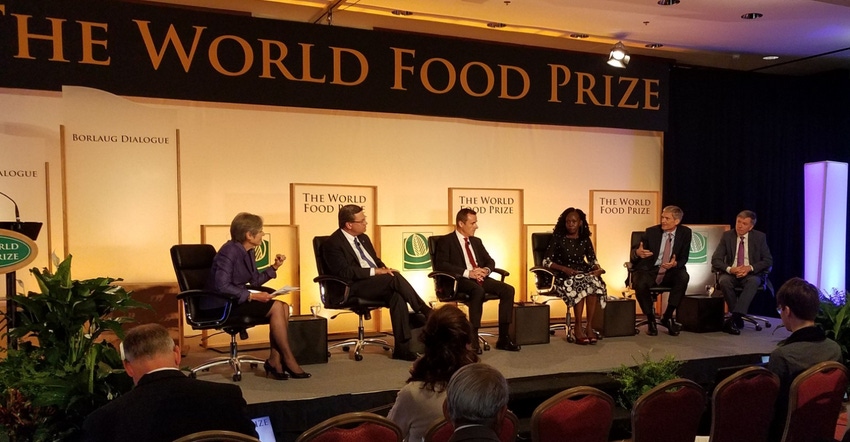Political, regulatory will stalling food production efforts
To balance need to double food production by 2050 and mitigate climate change, farmers need help.

As agricultural leaders from all over the world gathered at the World Food Prize Borlaug Dialogues Oct. 16-18, a key resonating message was the desire to balance the needs of feeding 9-10 billion people by 2050, sustainably preserving natural resources and mitigating climate change as well as maintaining farmer profitability. However, political will and regulatory will also are needed to help farmers succeed.
When asked whether agriculture today is on a path towards achieving all of those goals, private-sector executives who spoke on a panel focusing on the private sector’s role in food security said there are glimmers of hope, but based on the current trajectory, the industry is not on pace to achieve those goals.
Chris Nelson, president and chief executive officer of Kemin Industries, said he’s pessimistic about the outlook, but not due to the science and technology. “We are on the road to be able to provide technology” to meet these goals, he said, but the problem comes in the political and regulatory institutions.
Fall armyworm has devastated crops in areas of Africa, and Syngenta CEO Erik Fyrwald said technology exists today to combat the pest, as seen in their low prevalence in the Americas. “We would love to bring that technology, but we’re prohibited [due to] regulatory issues,” he said.
Liam Condon, president of Bayer AG’s crop science division, added that the political and regulatory will is heavily dependent on social acceptance. “As an industry, there is a lot of time focused on farmers but less spoken about the perceived benefits. Unless we engage [in explaining] what are benefits and risks, I fear a pushback on acceptance on innovation.”
Jim Collins, CEO of Corteva Agriscience, added that Corteva is focused on learning from some of the mistakes made with the introduction and use of genetically modified organisms (GMO) and becoming much more transparent about sharing the benefits of new varieties. Technologies such as gene editing can improve agronomics as well as improve the environment or offer specialized attributes.
Collins added that crops around the world can be designed to sequester carbon or better utilize nitrogen. “Those tools are here today. We’re looking to regulatory frameworks to accelerate those options,” he said.
Collins said agricultural companies today are helping farmers with amazing tools from biotechnology and thinking of ways to elevate the role agriculture can play in solving the two big challenges of feeding twice as many people while utilizing fewer inputs. Growers tend to be “mission driven,” he said. Growers are doing more things, but they need help.
“I think they need technology and the freedom to operate within the rules. It’s a common understanding that there’s a need, and [farmers] are looking to us for innovations and solutions,” Collins said. “We know no one company has all the answers.”
Condon added that it’s no longer just about feeding the world but not starving the planet and making agriculture part of the solution.
In speaking at a panel on climate change earlier in the dialogues, U.S. Farmers & Ranchers Alliance CEO Erin Fitzgerald said she believes the agriculture sector is the one that can make positive contributions to taking carbon out of the air. “When agriculture acts, it has a ripple effect,” Fitzgerald said. “When unleashed, we can suck down carbon more than any other solution.”
About the Author(s)
You May Also Like





